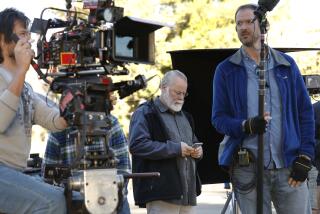Coming soon(er or later) to a theater near you
Four of Hollywood’s biggest 2012 movies are on hold until 2013.
Delayed and missing their dates at the box office are the sequel”G.I. Joe: Retaliation,”the zombie apocalypse tale “World War Z,” the fairy tale adaptation “Jack the Giant Killer” and the samurai epic “47 Ronin.”
“Ronin,” which stars Keanu Reeves, has been delayed four months. “Jack,” directed by Bryan Singer, was pushed back nine months. “G.I. Joe” was knocked off its release date just five weeks before its scheduled opening. “World War Z” got rescheduled six months ahead of its original release date.
Each of the four films had its own unique set of problems. But together they illustrate the unintended side-effect of their studios’ desire to claim the most profitable release dates, often before there is even a completed script — the moviemaking equivalent of sending out birth announcements before you’ve managed to get pregnant.
“It is commonplace now for the best release dates to be taken very far in advance, which means we are choosing a date well before the movie has begun shooting,” said Paramount Pictures film group president Adam Goodman. “When I first got into the business, it was the other way around.”
“World War Z” and “Ronin” are both complex pictures with budgets of about $170 million. Conflicts on the sets of both movies caused their studios to bail on their original release dates and led to plans for reshoots in the fall, according to knowledgeable people who were not authorized to speak publicly.
“World War Z’s” production was beset by creative and business differences among such key players as star and producer Brad Pitt, director Marc Forster (whose only previous tentpole movie experience was the James Bond sequel”Quantum of Solace”) and an array of producers and executives from four different financiers backing the picture.
Their principal source of anxiety was the ending of the film shot by Forster. Dissatisfied with the result, Paramount now has “Lost” co-creator Damon Lindelof writing a new conclusion and a new release date of June 21, 2013.
Similarly, Universal had difficulties with its first-time feature director Carl Rinsch, and now plans to reshoot the ending and other sequences of “47 Ronin.” The new filming is designed to beef up star Reeves’ character and make the movie less of an ensemble piece.
Last-minute date changes are not uncommon in Hollywood — Universal recently held its “The Bourne Legacy”by a week to avoid competing with Sony’s”Total Recall” remake. But four big pictures being pushed into a new year — so far — may be a new record.
Making post-production changes on a modern big-budget movie is complicated and costly. Studios not only need to reunite cast and crew who have moved onto other projects, but have to get special-effects houses to re-create their work on a fast schedule and often at a premium price.
“Introducing a single change into a script can mean redoing a hundred special-effects shots,” said a person close to one of the delayed movies who was not authorized to speak publicly. “You can’t believe how many people are working on it and how much it costs.”
It can also be embarrassing. Changing a movie’s release date, especially at the last minute, in the age of aggressive film blogs and Twitter, is a very public event.
“It used to be you could delay a movie and nobody outside the industry noticed,” said Bruce Berman, chief executive of Village Roadshow Pictures. “Today the whole world knows right away and you have to fight the presumption that there’s something wrong with your film before it even opens.”
But a little humiliation and tens of millions of dollars on reshoots may be preferable to the alternative. Hearts skipped a beat throughout Hollywood this spring at the spectacular failures of the would-be blockbusters”Battleship” and”John Carter,” which resulted in massive losses for Universal and Disney, respectively.
Fear of following in those movies’ footsteps was a factor in Paramount’s decision to delay its “G.I. Joe” sequel, which stars Dwayne Johnson and Bruce Willis, even though the studio had already spent millions marketing a June 29, 2012, launch.
The movie was good enough to be released, people close to the production said, but backers decided that it was worth the added cost to convert the film to 3-D and consider reshoots that would beef up the character played by Channing Tatum — and might even save his life. The new version may revive Tatum’s character, who was killed off in the version already shot.
Warner Bros.decided in January to push “Jack the Giant Killer,” director Bryan Singer’s revisionist take on the fairy tale, off its June release date, afraid of competing against the month’s other big movie,”Snow White and the Huntsman.”But the studio has taken advantage of its extra nine months to conduct reshoots as well, and now will release the film in March.
Hollywood’s holdups this year are already having repercussions far into the future. With three movies on its 2012 release schedule now pushed into 2013, Paramount recently delayed the release of its “Teenage Mutant Ninja Turtles” remake from December 2013 to May 2014.
And there could easily be more dashed hopes and delays ahead. Studios have already claimed a number of high-profile dates in 2014 for movies that are still in development, including sequels to”X-Men: First Class,””The Amazing Spider-Man”and “Transformers.”
“Smurfs 2,” meanwhile, is set for Aug. 2, 2013, and “Smurfs 3” has already claimed its opening date for July 24, 2015.
RELATED:
Keanu Reeves’ ‘47 Ronin’ delayed until 2013
Paramount delays ‘G.I. Joe: Retaliation; release until 2013
‘Katy Perry’ ‘Savages,’ will get caught in Spider-Man’s web
More to Read
From the Oscars to the Emmys.
Get the Envelope newsletter for exclusive awards season coverage, behind-the-scenes stories from the Envelope podcast and columnist Glenn Whipp’s must-read analysis.
You may occasionally receive promotional content from the Los Angeles Times.






